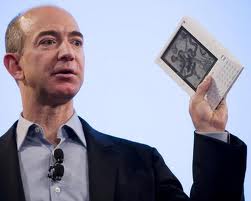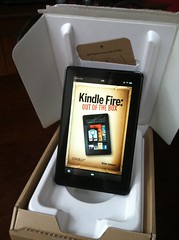Time to swap Amazon.com $199 for a Kindle Fire. I’ve to discover firsthand what makes it sexy and/or clunky. I have cast around for reviews, but now it’s time to understand what this increasingly ubiquitous device is all about. While I wait for the brown truck, you can catch up on my journey so far… Read the rest of this entry »
I’ve decided that I need to understand the Kindle Fire. I’ve borrowed, dabbled and delayed. So far it hasn’t been love at first sight. Not like my bride’s iPad, for example. I love it. Crave it. Waiting for next gen to own my own. Happy fortieth birthday, virtualDavis! Perhaps…
But the K-Fire is here to stay. For a while. Until its sexy progeny dethrone it. K-Fire’s adoption rate alone has been staggering, so I need to test drive this chunky Technicolor gizmo posthaste. I’m placing my order tonight, and I’ll dish up pick-nits and plaudits aplenty soon. Stay tuned.
Until then, consider these Kindle Fire pros and cons posted by O’Reilly Media’s Joe Wikert (@jwikert).
Kindle Fire Pros
- Form factor “It’s nice being able to wrap your hand around the entire device and the lighter weight is a big plus for the Fire.”
- Meets the needs of typical consumer “Consumers who want a cheap tablet are OK without all the bells and whistles of the iPad…”
- Connection to Amazon content “Connectivity to Amazon’s ebooks, video and audio content is second to none with the Fire.”
Kindle Fire Cons
- Connection to Amazon content “As easy as it is for Fire users to access Amazon content it’s just that difficult to access anyone else’s… my next tablet will not be locked in to one provider’s content.”
- Awful for the early adopter/tinkerer “.if you’re buying it to root and open it up you’ll be disappointed… [For example] some of the apps in the Android Market simply won’t run on it…”
- Auto-updates “How in the world can Amazon think that forcing OS updates on every Fire owner is the right thing to do? … Really stupid.”
- “Silk” browser “It turns out the browser isn’t that fast… in my totally unscientific side-by-side testing, the Fire almost always loaded pages slower than both my iPad and my RIM Playbook.”
- Missing a “killer” app “Amazon should have invested some money with the developers of apps like Zite and Flipboard to make sure they were available when the Fire launched.”
(Kindle Fire pros and cons list via Joe Wikert’s Publishing 2020 Blog.)
Everything Wikert has listed makes sense to me, but the most likely complaint likely to endure is the Amazon-centric content bias. I imagine the browser will get supercharged, and app developers are already following the consumer flood. But Amazon intends to exploit and nurture the content bias. No surprise there. And with millions of satisfied, well-trained consumers eager to gobble up Amazon distributed content, it’s no surprise that Bezos & Company aren’t eager to give away their monopoly.
Are you pleased or disappointed with your Kindle Fire? Share your experience in the comments below or Twitter, Facebook, Google+. And as soon as I’ve gotten my greedy paws (and eyes) on a Kindle Fire I’ll dish up my own Kindle Fire Pros & Cons. Now, let’s see how lickety-split Amazon Prime can hook me up…
Related articles
- Analyst: Amazon moved 6 million Kindle Fires over the holidays (digitaltrends.com)
- Amazon Revenue $17.43 Billion in Fourth Quarter, Income Down in 2011 (digitalbookworld.com)
- Hands On the New Kindle Fire (epicagear.com)
- Amazon says Kindle sales tripled during holidays (digitaltrends.com)
- Kindle Fire: Three pros, five cons (radar.oreilly.com)
- Amazon Sells 6 Million Kindle Fires in Q4 Alone According to Analysts (geeky-gadgets.com)
- Netflix Tells Amazon: ‘Been There, Done That’ (dailyfinance.com)

Publishing Industry’s Frenemy #1
Do you ever flash forward to 2050 or 2100 and wonder what students will be studying in the Publishing Industry chapter of their Economics books? Will encyclopedias (or Wikipedia) parade Amazon and Jeff Bezos as Gutenberg II or the Gutenberg Killer?
Amazon is busy making the entire book business a “direct-to-consumer” model. This isn’t new; they have been doing it for 15 years. By most accounts, the company is now the largest retailer of physical books and the dominant player in the digital space. What are Amazon’s priorities? It doesn’t hide them. In 2007, Amazon founder and CEO Jeff Bezos described a company that is “congenitally customer-focused” whose enduring priorities are selection, low prices and fast delivery.
Compare those priorities to the ones in place at most publishing houses. It’s easy to see where interests start to diverge. And if you apply Porter’s framework to Amazon, you quickly see why the company has become publishing’s best-known and most significant frenemy… The recent controversy involving an agent selling exclusive e-book rights to Amazon… has focused largely on royalty rates, the role of agents and the exclusive nature of the deal. I think that debate misses the point.
The publishing supply chain has shifted. The interests of the company best positioned to benefit from those changes are not aligned with those of most publishers today. Publishers can defend, change or co-opt, but they can’t stand still. Issue all the press releases you want, but realize this isn’t about e-book royalty rates. It’s about Amazon. (Magellan Media Partners)
Spot on, of course, the “publishng suppy chain has shifted” and ranting, soapboxing, naysaying “old school publishers” are liable to miss the train if they don’t start running down the platform and getting on board.
Look at the last decade in the music industry. There wil always be audiophiles who insist that the “new school” music supply chain is killing the music industry. Or has already killed the music industry. They’ll insist on higher definition audio, better acoustics, etc. And they’ll pay through the nose for their tastes and recalcitrance. That’s fine. It’s good. They’ll continue for a long time to support an increasingly niche but valuable pocket of culture and business. But they’re already a tiny minority. The music train left the station, and the landscape of the music industry shifted dramatically, rapidly and irrevocably.
Unfortunately, the book publishing industry isn’t sure it wants to run and catch the “new school” train out of the station. In fact, its not sure which direction it’s going, an aggravating predicament when trying to decide which train to chase… So instead of leaping on the Amazon Express to the future or the Gutenberg Paradigm to niche-bibliophile-land, the publishing industry is planted on the platform throwing a temper tantrum. “I don’twant to go anywhere! I like it right heeeeeeeere… And I get motion sickness. And I have waaayyy too many traveling companions to fit on that dinky little train. And there’s no first class. I ONLY travel first class!”
Jeff Bezos Doesn’t Want You to Know 5 Kindle Pitfalls

This is a good counterpoint to the flood of Amazon-awed Kindle points that I and many others have been sharing in recent months. I don’t know how accurate these claims are, but I admit that I’ve shied away from buying a Kindle so far because my “test drives” have left me wanting further improvements before I take the leap. These five claims are worth exploring:
- You read slower on a Kindle.
- You almost certainly read stupider on a Kindle.
- The Kindle flunked out of Princeton.
- Amazon can play Big Brother with your books.
- Governments can play Big Brother with your books.
(“Five Things Jeff Bezos Doesn’t Want You to Know”,Regulator Bookshop)
There are interesting articles and test results cited to substantiate these claims, but I wonder about your experience with Kindle. Do you read slower with a Kindle? Less inteligently? Are you worried about Amazon of the Fed snooping (and potentially censoring) your reading list?





